This post may contain affiliate links. Please see our disclosure policy.
Canning pot roast in a jar turns an all-day Sunday pot roast into a quick meal in a jar that’s ready to heat and eat. The pressure canner will yield delicious, tender pot roast every time without a fuss!
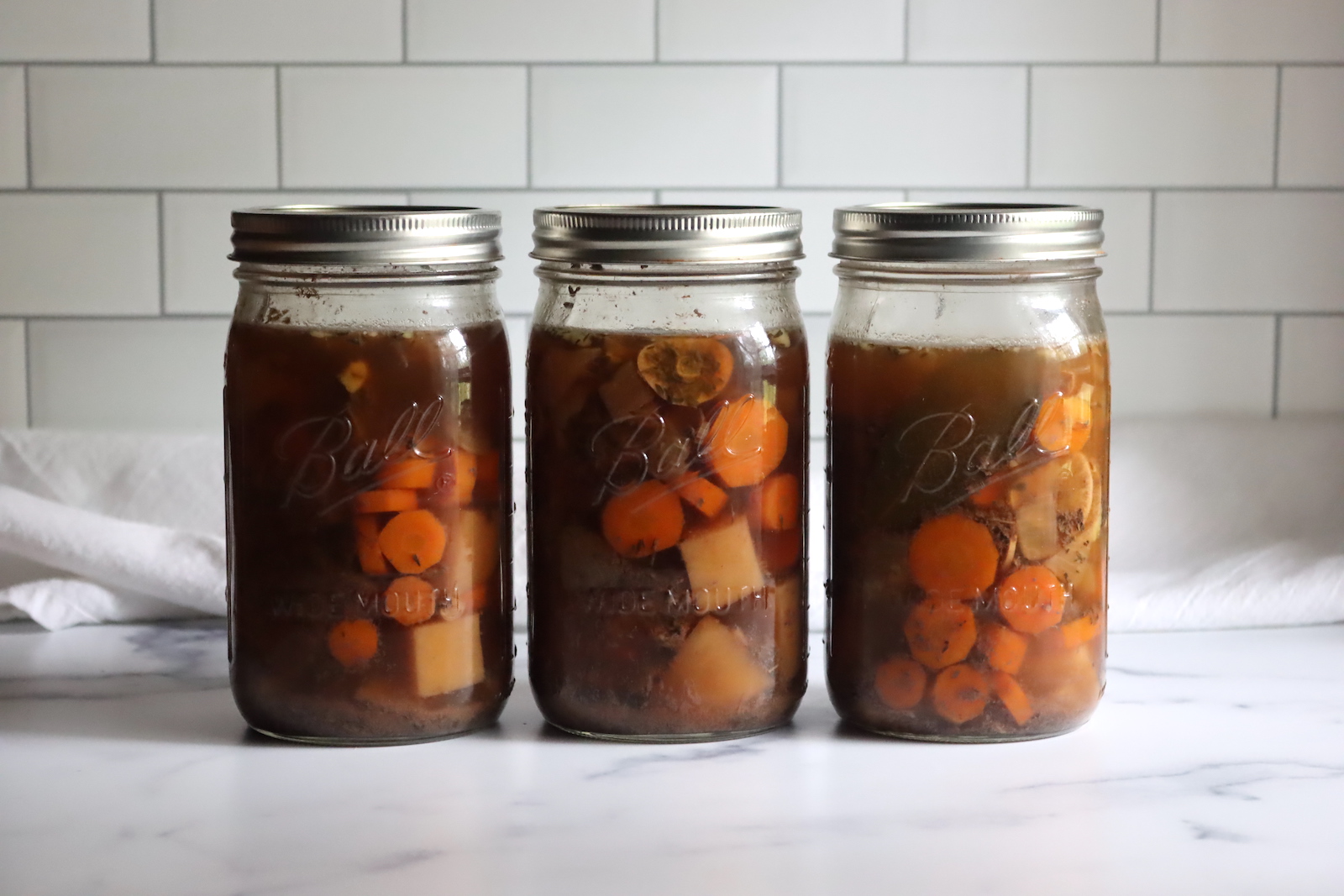
Table of Contents
- Ingredients for Pot Roast in a Jar
- Canning Pot Roast in a Jar
- Canning Leftover Pot Roast
- Serving Pot Roast in a Jar
- Canning Pot Roast in a Jar Recipe
- Altitude Adjustments for Canning Pot Roast
- For dial gauge pressure canners:
- For weighted gauge pressure canners:
- Beef Canning Recipes
- Meal in a Jar Canning Recipes
- Meat Canning Recipes
Pot roast is a quintessential comfort food, perfect for any season, and usually cooked for hours in a slow cooker or oven.
But what if you want to enjoy the taste of pot roast whenever you want – without having to spend hours preparing it?
That’s where canning pot roast in a jar comes in. It’s a great way to preserve a large batch of pot roast so you always have a tasty, nutritious meal ready to go whenever you want it.
Here’s how to make a canner load of pot roast in a jar!
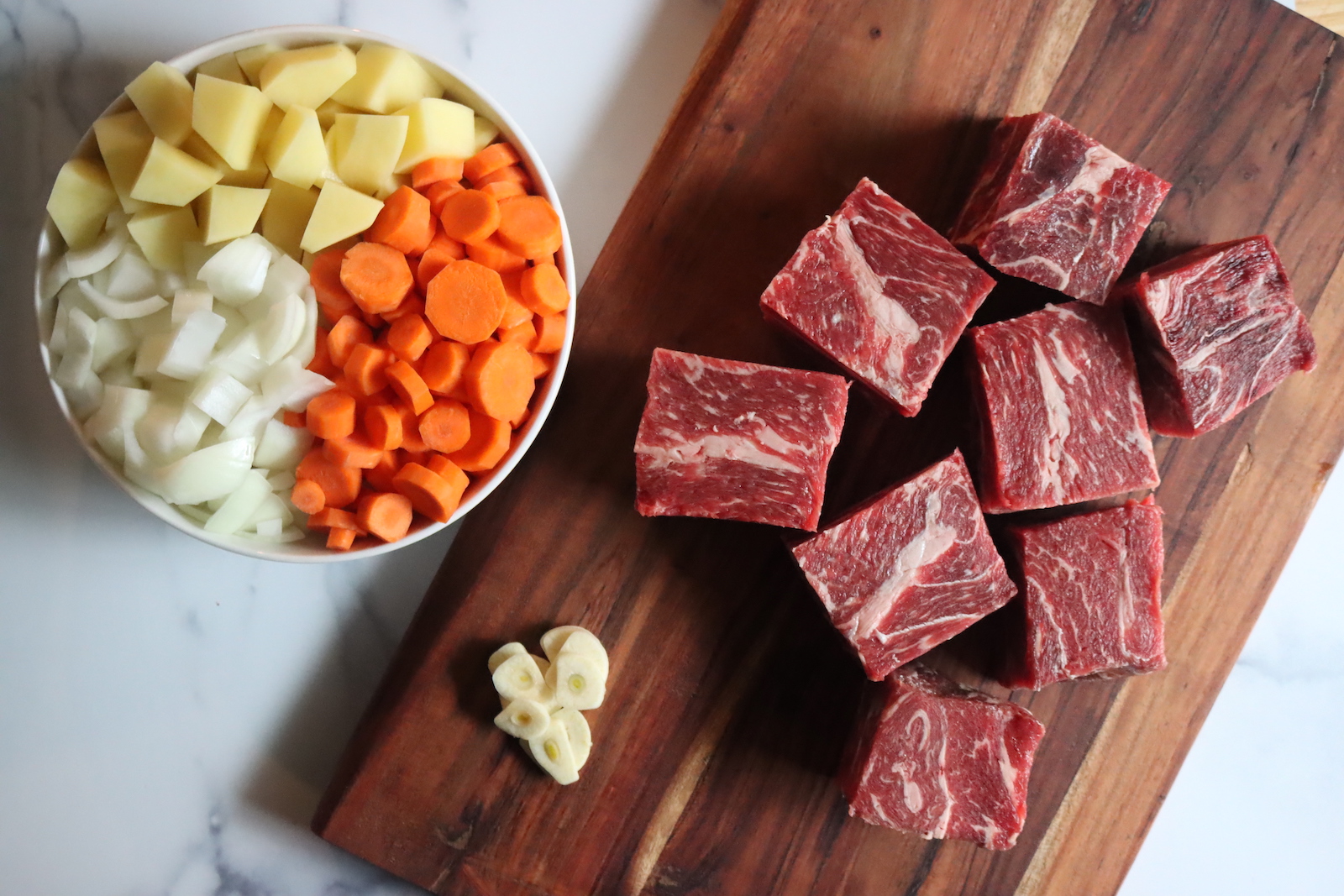
This is a simple raw pack canning recipe, where all the ingredients are just packed raw into the jars, and then the jars are filled with boiling broth before canning.
You can’t do that with every recipe, but this is a specific recipe tested by Ball Canning and adapted for raw pack.
It’s a lot easier to load everything into the jars cool, without burning your hands, especially when you’re working with big hunks of beef.
The main thing here is to make sure you’ve cubed the meat small enough to get through the jar opening, so you’re looking at about 2 1/2 inches square. Be sure to divide everything up evenly across all the jars, and don’t overpack any one jar.
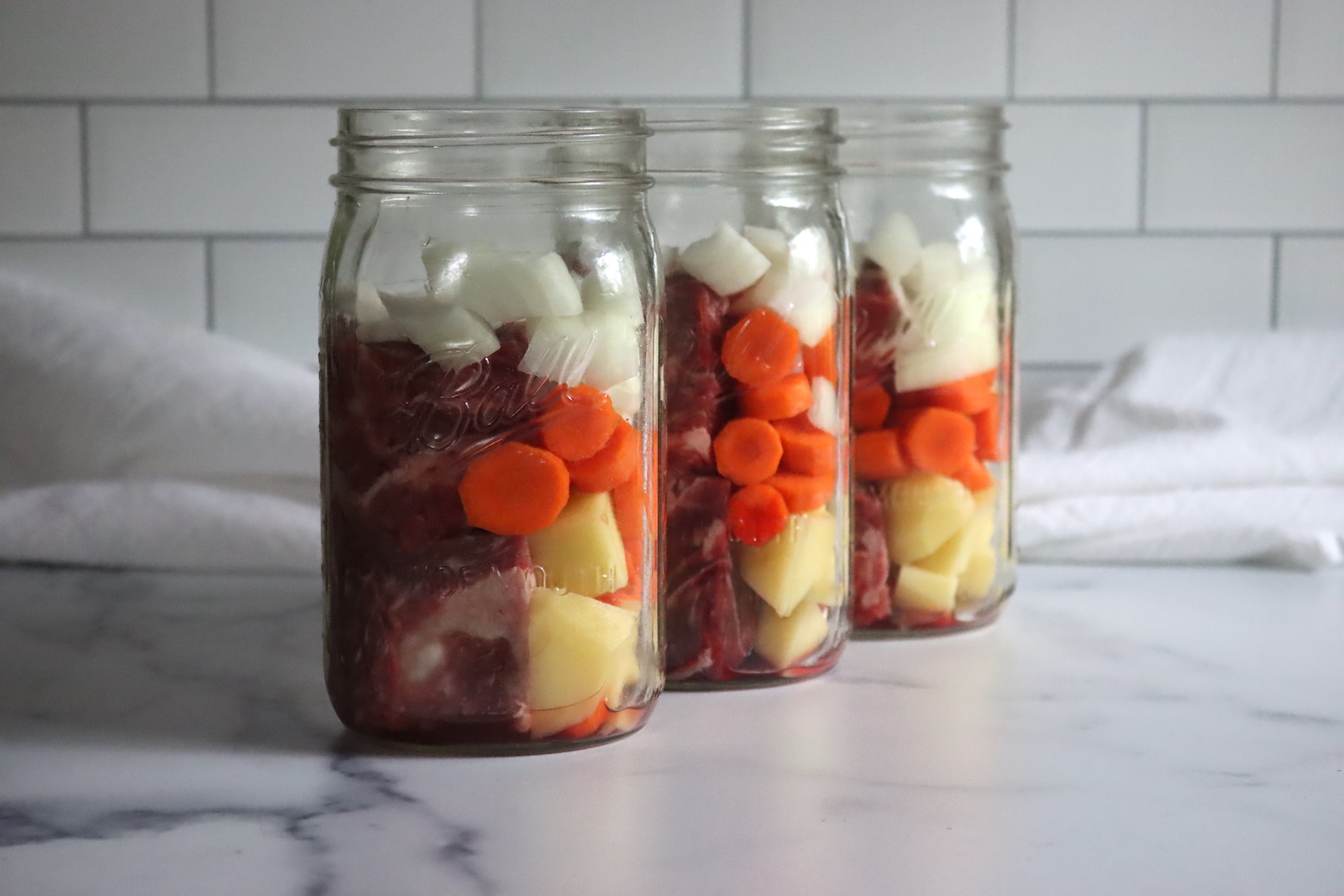
Ingredients for Pot Roast in a Jar
This recipe is adapted from a tested recipe for canning pot roast from Ball Canning. It’s listed under their “Simple One Jar Meals” section of the All New Ball Book of Canning and Preserving.
The ingredients for canning pot roast in a jar are quite simple. To make a canner batch of four pints or two quarts, you’ll need the following:
- 2 lb (1 kg) boneless beef chuck roast, fat trimmed and meat cut into 2-inch (5 cm) chunks
- 2 tsp (10 ml) salt
- 1 tsp (5 ml) ground black pepper
- 2 sliced garlic cloves
- 2 bay leaves
- 2 tsp (10 ml) dried thyme
- 1 cup (250 ml) dry red wine
- 1 cup (250 ml) sliced carrots
- 1 cup (250 ml) diced onions
- 1 cup (250 ml) peeled, diced potatoes
- ½ cup (125 ml) diced celery
- Boiling water or broth to fill
If you’re canning in quarts, as I am, then each jar gets half of the solids. That’s about 1 pound of cubed meat, 1/2 cup of carrots, 1/2 cup of onions, 1/4 cup celery and 1/2 cup of potatoes. Personally, I don’t like celery, so I skip it.
The red wine is optional, but if you do add it, it’s added at a rate of 1/2 cup per quart jar. The remaining liquid is boiling water or stock. You’ll need about 1 1/2 to 2 cups of stock or water per jar to bring them up to the 1” headspace line. (But keep in mind, you may need more or less to get the proper headspace.)
If there’s an ingredient your family doesn’t like, you can skip it, just don’t add anything else in its place and be sure to have extra broth or water on hand to fill the jars.
You may use any type of celery, onions, potatoes, and carrots you’d like for this recipe.
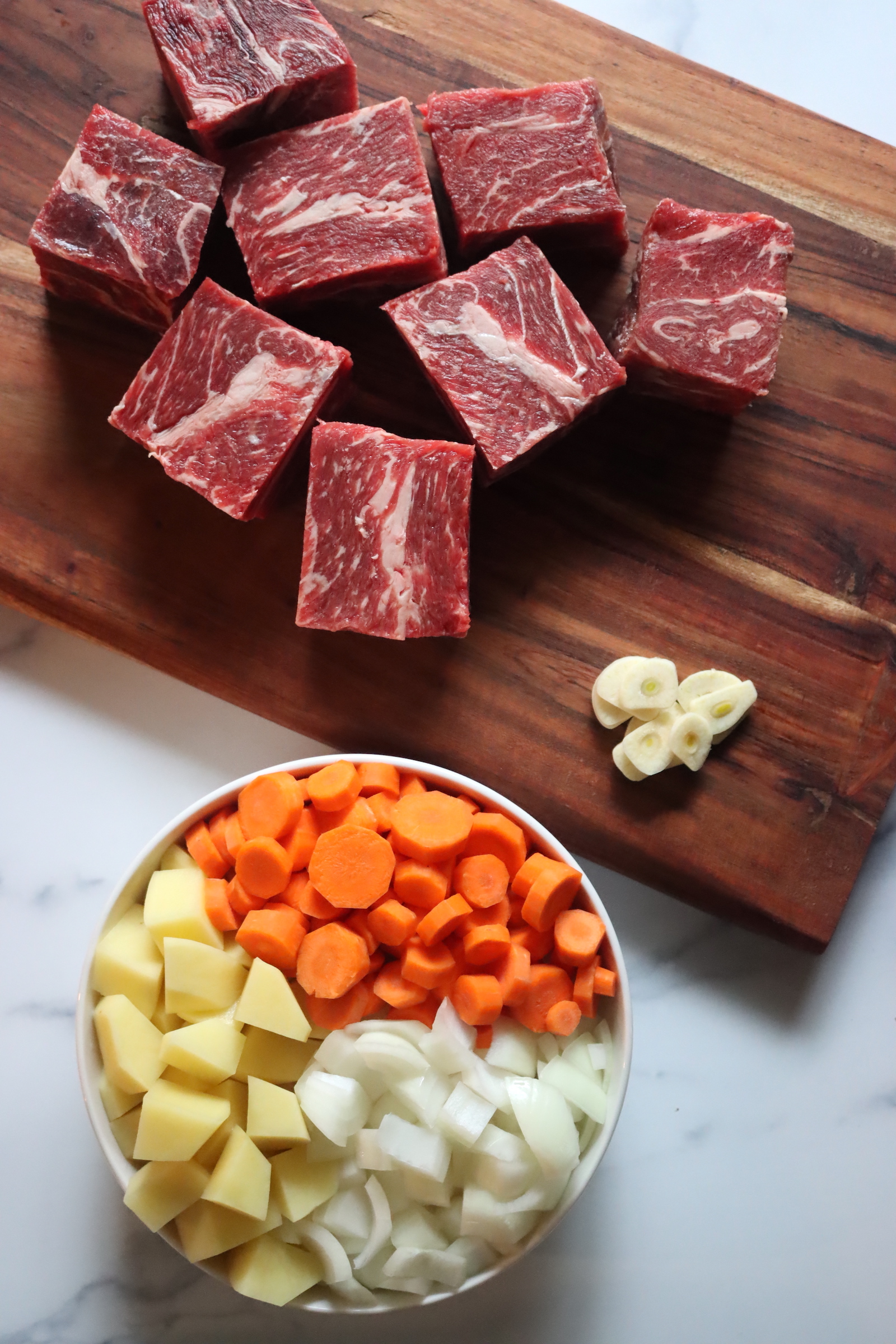
Canning Pot Roast in a Jar
Making pot roast in a jar is easier than you might think!
To get started, prepare the pressure canner and jars. Keep the jars warm until you’re ready to fill them. Your pressure canner should be placed on the stove and filled with 2 inches (8 cm) of water, depending on the instructions of the canner manufacturer. Since this is a raw pack recipe, the canner should be just barely warm, at about 140 degrees F. Don’t bring it all the way up to simmering before loading the jars.
Combine all of the ingredients into a large bowl. Mix well and pack into jars. (Or simply divide the solids evenly among the jars, then add the red wine if using.)
Pour boiling water or stock over the top of the meat and vegetables in the jars, leaving 1” headspace. You should need about 1 1/2 to 2 cups per quart jar, but you may need more or less, so be prepared with a bit extra.
Remove air bubbles, double-check headspace, then apply the lids and bands. Tighten the bands until they are fingertip tight.
Load the jars into the pressure canner. Put the lid on the canner, then turn it to the locked position. Turn the heat on medium-high, then vent steam for 10 minutes. Put the counterweight or weighted gauge on the vent, then bring the canner to a pressure of 10 lbs for a weighted-gauge canner or 11 lbs for a dial-gauge canner.
Process for 90 minutes (quarts) or 75 minutes (pints). Remember to adjust your timer if the pressure drops below 10 (weighted gauge) or 11 lbs (dial gauge).
When the canning time has finished, you may turn the heat off. Let the canner depressurize, then, five minutes after that, remove the lid. Allow the jars to cool for 10 minutes, then remove them from the canner.
Let the jars cool for another 24 hours at room temperature. Check the seals, label the jars, and put them in storage for up to one year.
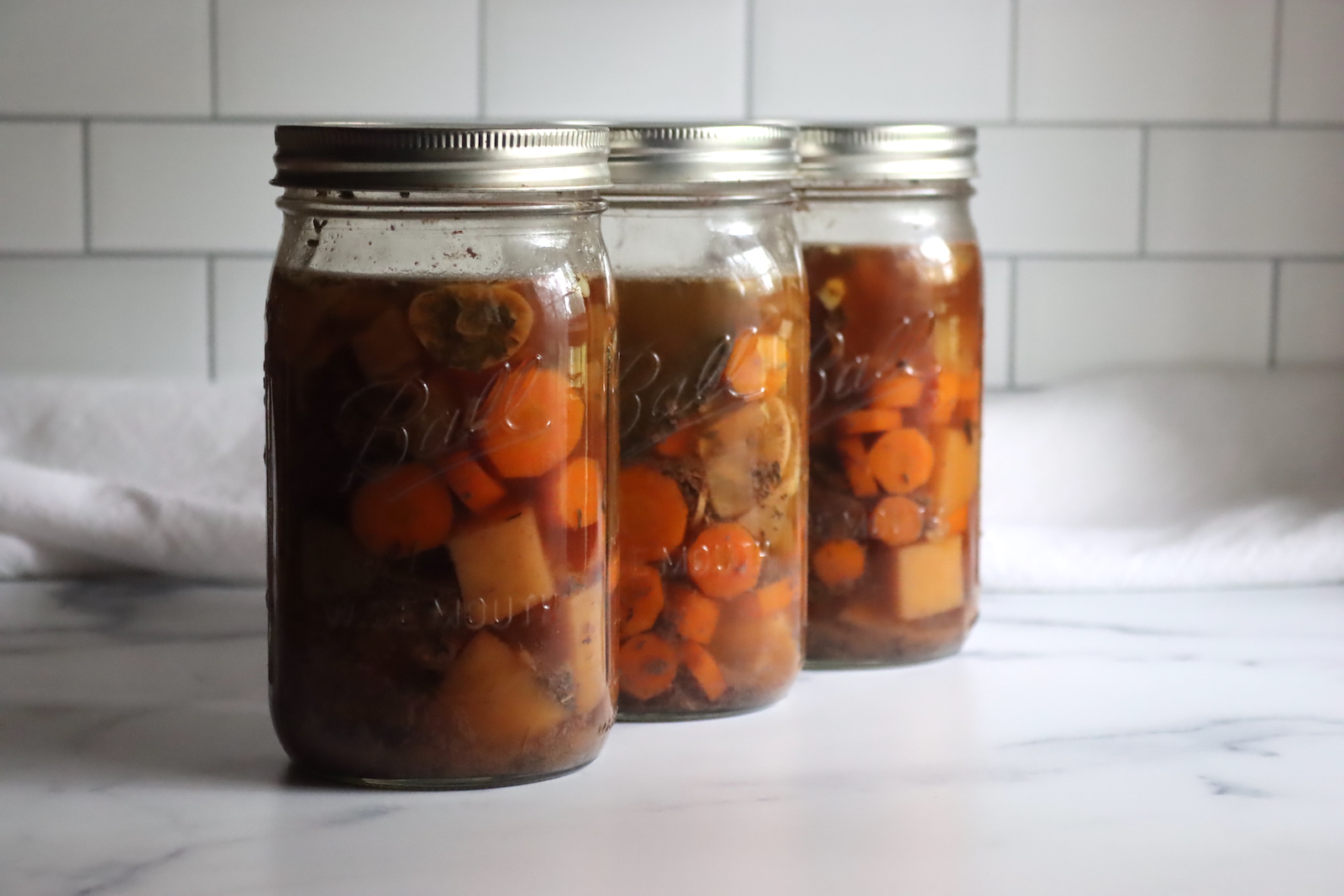
Altitude Adjustments for Canning Pot Roast
With pressure canning, the processing times stay the same at higher altitudes, but the pressures change. Here are the altitude adjustments for pressure canning:
For dial gauge pressure canners:
- 0 to 2,000 feet in elevation – 11 lbs pressure
- 2,001 to 4,000 feet in elevation – 12 lbs pressure
- 4,001 to 6,000 feet in elevation – 13 lbs pressure
- 6,001 to 8,000 feet in elevation – 14 lbs pressure
For weighted gauge pressure canners:
- 0 to 1,000 feet in elevation – 10 lbs pressure
- Above 1,000 feet – 15 lbs pressure
Canning Leftover Pot Roast
This is a raw-pack canning recipe, but a number of people have asked about canning leftover pot roast after you make a big batch in the crock pot.
Believe it or not, there’s a good chance that you can process your leftover pot roast as well. There are two considerations here.
First, the ingredients in your pot roast must all be approved for home canning. You can’t put it up if you use flour in your recipe, even if it’s just a small amount used to brown the meat. Check your ingredients carefully.
Second, make sure that the jars are packed with plenty of broth. Fill the jars no more than 1/2 to 2/3 full of solids, not packed tightly down, and then fill the remaining space with boiling broth or water (or the liquid from the pot roast itself).
Then follow the same canning instructions, and you should be able to can leftover pot roast safely.
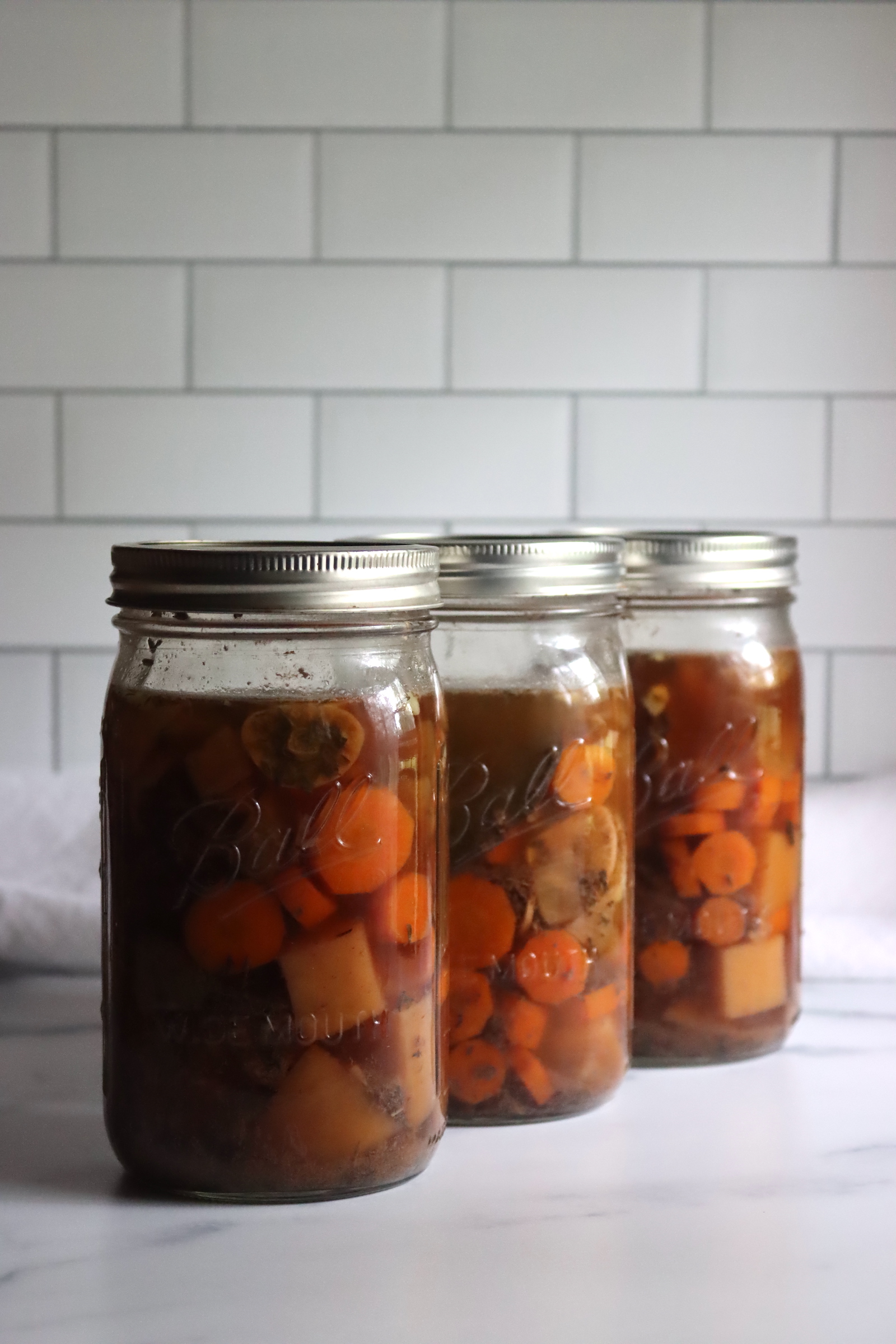
Serving Pot Roast in a Jar
To serve this delicious recipe, all you need to do is transfer the contents of the jar to a saucepan. For quarts, whisk in 2 Tbsp (30 ml) of flour until the ingredients are well combined. For pints, mix in 1 Tbsp (15 ml) of flour. Simmer the mixture for 10 minutes over medium heat, stirring often to prevent clumping.
Pot roast in a jar is not only a great option for a quick lunch or dinner, but it’s also perfect for meal prepping. You can make a large batch and portion them out for the week. Try adding some variety by changing up the types of vegetables you use or adding some cooked grains. You can also use the pot roast in a jar as a filling for a hearty sandwich or wrap.
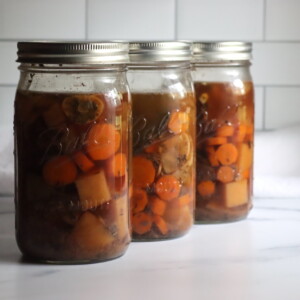
Canning Pot Roast in a Jar
Equipment
- Wide Mouth Quart Mason Jars
- Wide Mouth Canning Lids
- Jar Lifter
Ingredients
- 2 lb beef chuck roast, boneless, fat trimmed and meat cut into 2-inch (5 cm) chunks
- 2 tsp salt
- 1 tsp Ground black pepper
- 2 cloves garlic, sliced
- 2 bay leaves
- 2 tsp dried thyme
- 1 cup dry red wine
- 1 cup carrots, sliced
- 1 cup onions, diced
- 1 cup potatoes, peeled, diced
- ½ cup celery, diced
- Boiling Water or Broth to Fill, about 1 quart
Instructions
- Prepare the pressure canner and jars. Keep the jars warm until you're ready to fill them. Your pressure canner should be placed on the stove and filled with 2 inches (8 cm) of water, depending on the instructions of the canner manufacturer.
- Heat the canner water to just barely hot, about 140 degrees Fahrenheit, on the stovetop while you're preparing your pot roast.
- Combine all of the ingredients in a large bowl. Mix well.
- Pack the jars with the mixture. Add hot water or broth to top them off.
- Remove air bubbles, double-check headspace, then apply the lids and bands. Tighten the bands until they are fingertip tight.
- Load the jars into the pressure canner.
- Put the lid on the canner, then turn it to the locked position. Turn the heat on medium-high, then vent steam for 10 minutes.
- Put the counterweight or weighted gauge on the vent, then bring the canner to a pressure of 10 lbs for a weighted-gauge canner or 11 lbs for a dial-gauge canner. (Adjust for altitude if above 1,000 feet in elevation.)
- Process for 90 minutes (quarts) or 75 minutes (pints). Remember to adjust your timer if the pressure drops below 10 (weighted gauge) or 11 lbs (dial gauge).
- When the canning time has finished, you may turn the heat off. Let the canner depressurize, then, five minutes after that, remove the lid.
- Allow the jars to cool for 10 minutes, then remove them from the canner.
- Let the jars cool for another 24 hours at room temperature.
- Check the seals, label the jars, and put them in storage for up to one year.
Notes
Altitude Adjustments for Canning Pot Roast
With pressure canning, the processing times stay the same at higher altitudes, but the pressures change. Here are the altitude adjustments for pressure canning:For dial gauge pressure canners:
- 0 to 2,000 feet in elevation – 11 lbs pressure
- 2,001 to 4,000 feet in elevation – 12 lbs pressure
- 4,001 to 6,000 feet in elevation – 13 lbs pressure
- 6,001 to 8,000 feet in elevation – 14 lbs pressure
For weighted gauge pressure canners:
- 0 to 1,000 feet in elevation – 10 lbs pressure
- Above 1,000 feet – 15 lbs pressure
Nutrition
Nutrition information is automatically calculated, so should only be used as an approximation.
Beef Canning Recipes
There’s more than one way to put beef in a jar! These beef canning recipes will keep things interesting:
- Canning Beef Stew
- Canning Ground Beef
- Canning Sloppy Joe Filling
- Canning Chili con Carne
- Canning Beef Pot Pie Filling
Meal in a Jar Canning Recipes
Need a few more meal-in-a-jar canning recipes?
Meat Canning Recipes
Working with other types of meat? Check out these other meat canning recipes!
- 20+ Chicken Canning Recipes
- Canning Leftover Turkey
- Canning Chicken Chili Verde
- Canning White Bean Chicken Chili
- Canning Chicken Soup
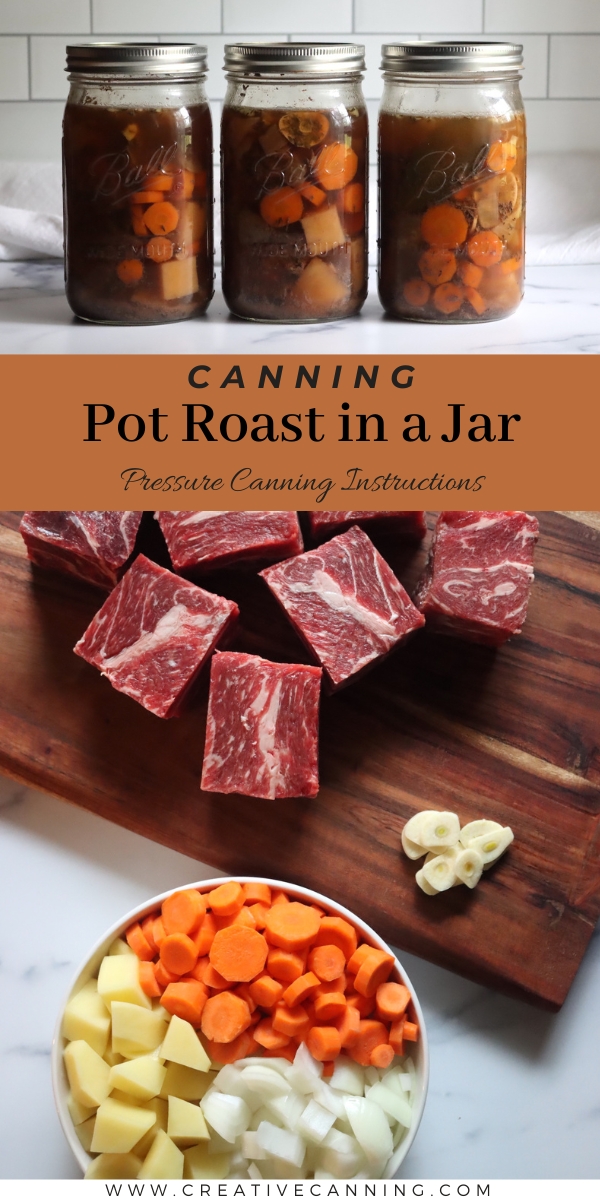
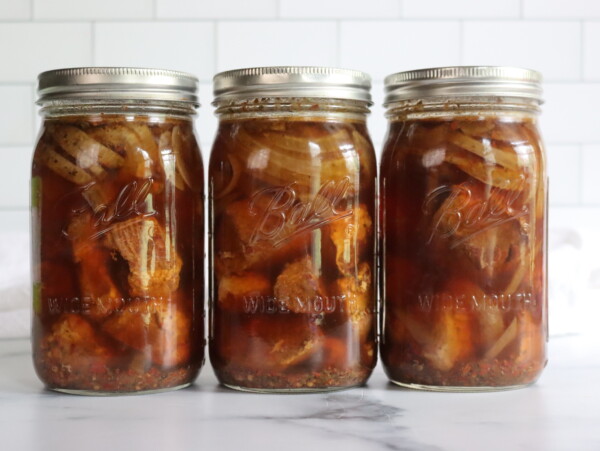
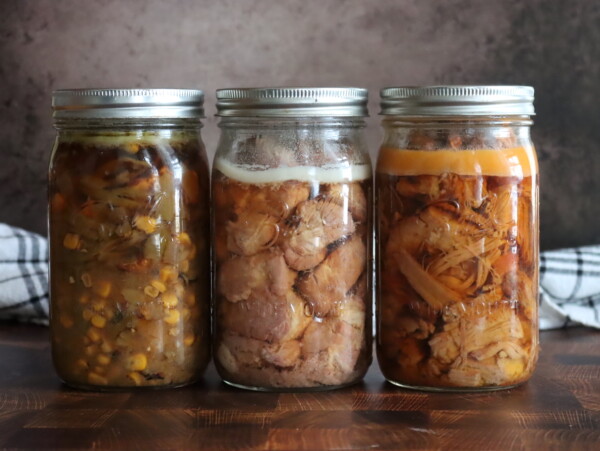
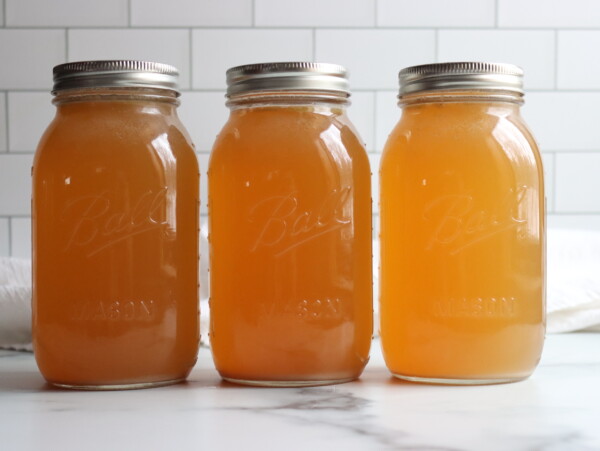
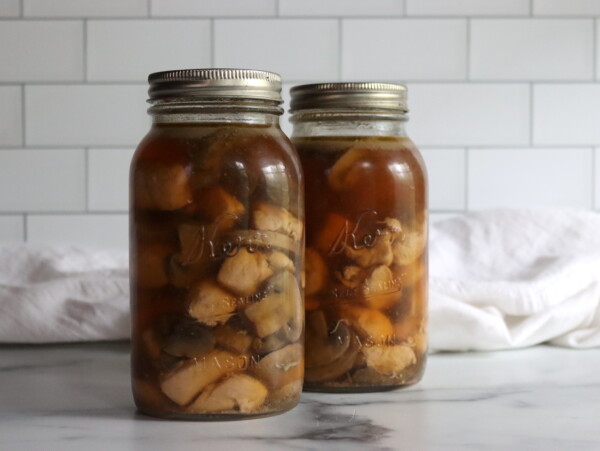
Can you substitute soy sauce for red wine in the pot roast recipe.
That’s fine in terms of canning safety, as the red wine in this recipe is for flavor rather than adding acidity. That’d be a lot of soy sauce, so I’d personally recommend using a bit of soy sauce and then water or broth to make up the difference. You can use Worcestershire sauce too, which I think would give you better flavor than soy sauce. Both, however, have a lot of extra salt, and you may need to adjust the salt in the recipe down a bit. I’m not sure exactly how much, it depends on how much soy sauce you use. Best of luck with it!
Could I add Worcestershire Sauce to this? Like 1/2 tablespoon per quart?
Yes, that’s perfectly fine. Enjoy!
How many quarts does this recipe make?
This is a small batch recipe that makes 2 quarts or 4 pints. You can increase the recipe as much as you like, based on the capacity of your canner.
Is it okay to can more than 2 quarts at a time?
Yup, you can make this recipe as large as you like. The minimum for a pressure canner batch is 2 quarts, but the maximum is as much as your canner can hold. I make this as a 14 quart batch in my All American Canner.